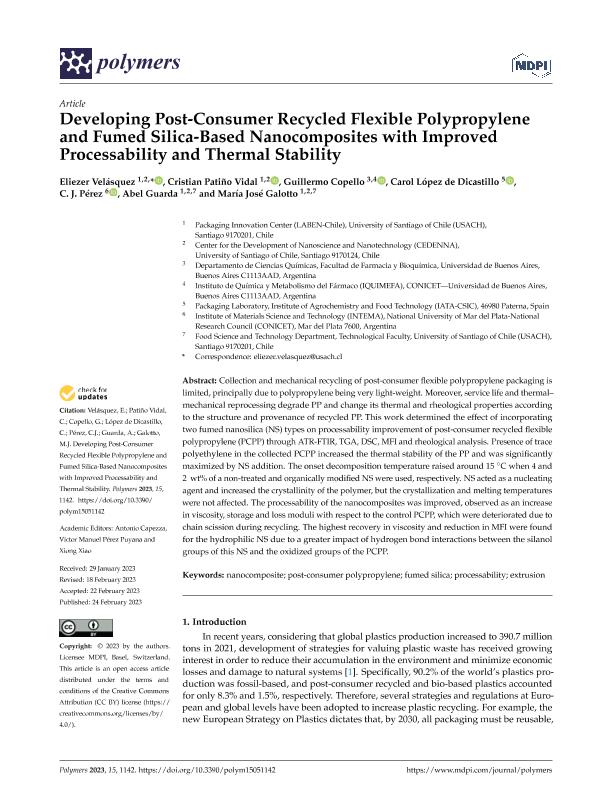Artículo
Developing Post-Consumer Recycled Flexible Polypropylene and Fumed Silica-Based Nanocomposites with Improved Processability and Thermal Stability
Velásquez, Eliezer; Patiño Vidal, Cristian; Copello, Guillermo Javier ; López de Dicastillo, Carol; Pérez, Claudio Javier
; López de Dicastillo, Carol; Pérez, Claudio Javier ; Guarda, Abel; Galotto, María José
; Guarda, Abel; Galotto, María José
 ; López de Dicastillo, Carol; Pérez, Claudio Javier
; López de Dicastillo, Carol; Pérez, Claudio Javier ; Guarda, Abel; Galotto, María José
; Guarda, Abel; Galotto, María José
Fecha de publicación:
02/2023
Editorial:
MDPI
Revista:
Polymers
ISSN:
2073-4360
Idioma:
Inglés
Tipo de recurso:
Artículo publicado
Clasificación temática:
Resumen
Collection and mechanical recycling of post-consumer flexible polypropylene packaging is limited, principally due to polypropylene being very light-weight. Moreover, service life and thermal–mechanical reprocessing degrade PP and change its thermal and rheological properties according to the structure and provenance of recycled PP. This work determined the effect of incorporating two fumed nanosilica (NS) types on processability improvement of post-consumer recycled flexible polypropylene (PCPP) through ATR-FTIR, TGA, DSC, MFI and rheological analysis. Presence of trace polyethylene in the collected PCPP increased the thermal stability of the PP and was significantly maximized by NS addition. The onset decomposition temperature raised around 15 °C when 4 and 2 wt% of a non-treated and organically modified NS were used, respectively. NS acted as a nucleating agent and increased the crystallinity of the polymer, but the crystallization and melting temperatures were not affected. The processability of the nanocomposites was improved, observed as an increase in viscosity, storage and loss moduli with respect to the control PCPP, which were deteriorated due to chain scission during recycling. The highest recovery in viscosity and reduction in MFI were found for the hydrophilic NS due to a greater impact of hydrogen bond interactions between the silanol groups of this NS and the oxidized groups of the PCPP.
Archivos asociados
Licencia
Identificadores
Colecciones
Articulos(INTEMA)
Articulos de INST.DE INV.EN CIENCIA Y TECNOL.MATERIALES (I)
Articulos de INST.DE INV.EN CIENCIA Y TECNOL.MATERIALES (I)
Articulos(IQUIMEFA)
Articulos de INST.QUIMICA Y METABOLISMO DEL FARMACO (I)
Articulos de INST.QUIMICA Y METABOLISMO DEL FARMACO (I)
Citación
Velásquez, Eliezer; Patiño Vidal, Cristian; Copello, Guillermo Javier; López de Dicastillo, Carol; Pérez, Claudio Javier; et al.; Developing Post-Consumer Recycled Flexible Polypropylene and Fumed Silica-Based Nanocomposites with Improved Processability and Thermal Stability; MDPI; Polymers; 15; 5; 2-2023; 1142-1158
Compartir
Altmétricas



